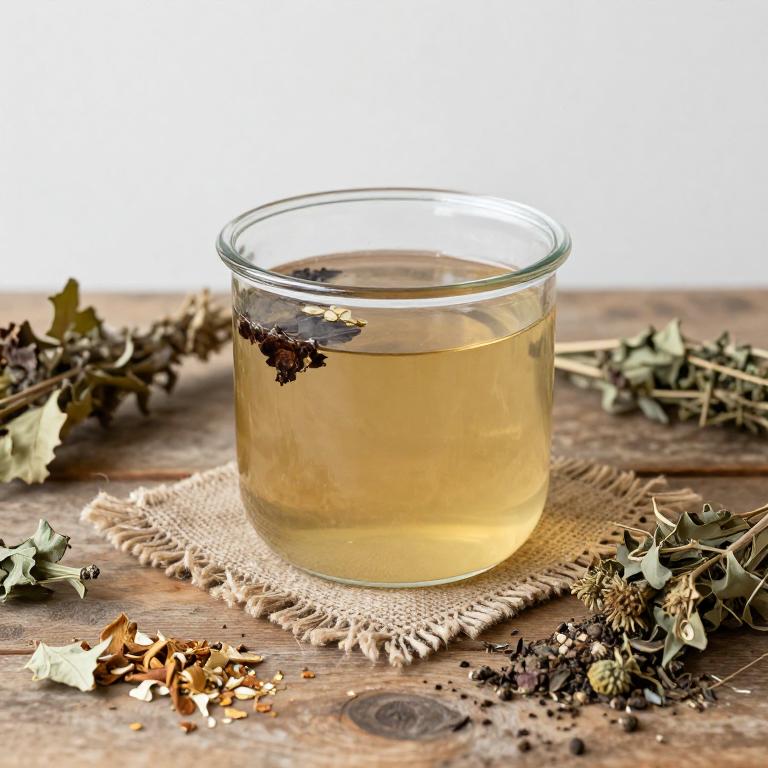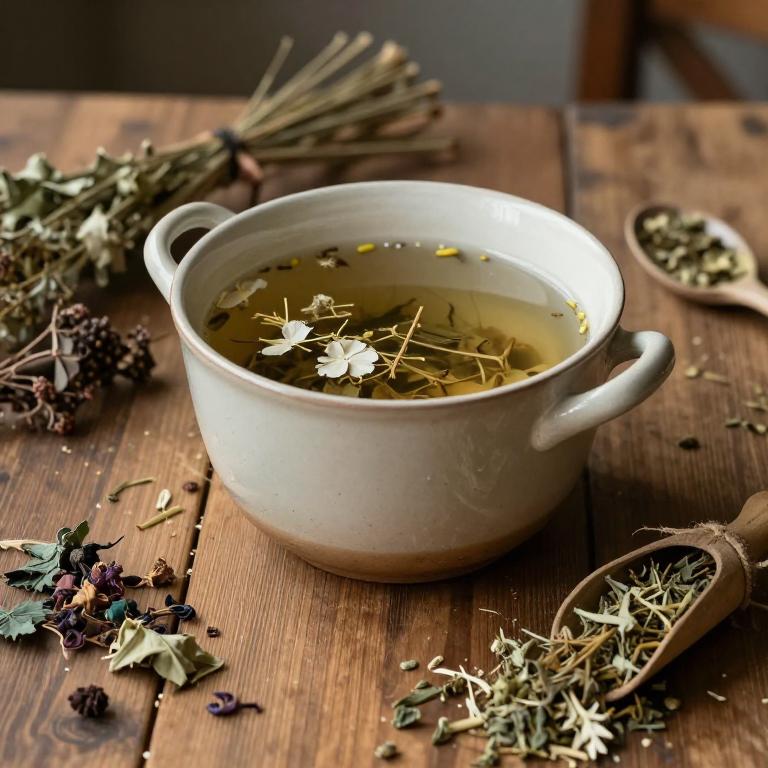10 Best Herbal Decoctions For Gastroenteritis

Herbal decoctions have been traditionally used to alleviate symptoms of gastroenteritis, a condition characterized by inflammation of the stomach and intestines.
These preparations typically include a blend of herbs such as ginger, licorice root, and peppermint, which are known for their anti-inflammatory, antispasmodic, and digestive properties. The process involves simmering the selected herbs in water to extract their active compounds, resulting in a soothing and easily digestible liquid. Herbal decoctions can help reduce nausea, vomiting, and diarrhea while supporting the body's natural recovery process.
However, it is important to consult a healthcare professional before using herbal remedies, especially for severe or persistent cases of gastroenteritis.
Table of Contents
- 1. Ginger (Zingiber officinale)
- 2. Turmeric (Curcuma longa)
- 3. Black pepper (Piper nigrum)
- 4. Dog rose (Rosa canina)
- 5. Cumin (Cuminum cyminum)
- 6. Peppermint (Mentha piperita)
- 7. Thistle (Silybum marianum)
- 8. Licorice (Glycyrrhiza glabra)
- 9. Marshmallow (Althaea officinalis)
- 10. Fennel (Foeniculum vulgare)
1. Ginger (Zingiber officinale)

Zingiber officinale, commonly known as ginger, has been widely used in traditional medicine for its therapeutic effects on the gastrointestinal system.
Herbal decoctions made from fresh or dried ginger root are often prepared by simmering the rhizome in water to extract its bioactive compounds, such as gingerol and shogaol. These decoctions are known to possess anti-inflammatory, antimicrobial, and antispasmodic properties, which can help alleviate symptoms of gastroenteritis, including nausea, vomiting, and abdominal pain. The warming effects of ginger also aid in improving digestion and reducing intestinal discomfort.
Due to its accessibility and efficacy, ginger decoctions remain a popular complementary treatment for managing mild to moderate cases of gastroenteritis.
2. Turmeric (Curcuma longa)

Curcuma longa, commonly known as turmeric, is widely used in traditional medicine for its anti-inflammatory and antimicrobial properties.
Herbal decoctions made from Curcuma longa have been traditionally employed to treat gastroenteritis due to their ability to soothe the gastrointestinal tract and reduce inflammation. The active compound, curcumin, contributes to the decoction's effectiveness by inhibiting the growth of pathogenic bacteria and reducing oxidative stress. These decoctions are often prepared by simmering the rhizomes in water, resulting in a potent remedy that can alleviate symptoms such as diarrhea and abdominal pain.
While generally safe, it is advisable to consult a healthcare professional before using turmeric decoctions, especially for prolonged periods or in combination with other medications.
3. Black pepper (Piper nigrum)

Piper nigrum, commonly known as black pepper, has been traditionally used in herbal medicine for its potential therapeutic effects on gastrointestinal health.
Herbal decoctions made from black pepper are believed to aid in the treatment of gastroenteritis by stimulating digestive secretions and improving gut motility. The active compound piperine in black pepper may enhance the absorption of other nutrients and reduce inflammation in the digestive tract. While some studies suggest its anti-inflammatory and antimicrobial properties could support recovery from gastroenteritis, more clinical research is needed to confirm its efficacy.
As with any herbal remedy, it is advisable to consult a healthcare professional before using black pepper decoctions, especially for individuals with pre-existing health conditions.
4. Dog rose (Rosa canina)

Rosa canina, commonly known as dog rose, has been traditionally used in herbal medicine for its potential benefits in treating gastroenteritis.
The herbal decoction of Rosa canina is prepared by boiling the dried flowers and fruits in water, creating a soothing and digestible remedy. This decoction is believed to help reduce inflammation in the gastrointestinal tract and alleviate symptoms such as diarrhea and nausea. It is often recommended for its mild antispasmodic and astringent properties, which may support digestive health.
However, it is important to consult a healthcare professional before using Rosa canina decoctions, especially for individuals with chronic conditions or those taking other medications.
5. Cumin (Cuminum cyminum)

Cuminum cyminum, commonly known as cumin, has been traditionally used in herbal medicine for its potential therapeutic effects on the digestive system.
Herbal decoctions made from cumin seeds are often prepared by simmering the seeds in water to extract their essential oils and active compounds. These decoctions are believed to help alleviate symptoms of gastroenteritis, such as nausea, vomiting, and abdominal cramping, due to their carminative and anti-inflammatory properties. The essential oils in cumin, including cuminaldehyde and limonene, may support gut health by promoting digestion and reducing intestinal inflammation.
While more scientific research is needed, preliminary studies suggest that cumin-based herbal decoctions could be a complementary approach in managing mild cases of gastroenteritis.
6. Peppermint (Mentha piperita)

Mentha piperita, commonly known as peppermint, has been traditionally used in herbal medicine for its soothing effects on the gastrointestinal tract.
Peppermint herbal decoctions are often prepared by steeping dried leaves in hot water, creating a calming infusion that can help alleviate symptoms of gastroenteritis. The active compounds in peppermint, such as menthol and rosmarinic acid, possess antimicrobial and antispasmodic properties that may help reduce inflammation and ease digestive discomfort. These decoctions are typically recommended for mild cases of gastroenteritis to relieve nausea, bloating, and abdominal cramps.
However, it is important to consult a healthcare provider before using peppermint decoctions, especially in children or individuals with certain medical conditions.
7. Thistle (Silybum marianum)

Silybum marianum, commonly known as milk thistle, has been traditionally used in herbal medicine for its potential hepatoprotective properties.
While it is widely studied for liver health, its use in treating gastroenteritis is less common and primarily based on its anti-inflammatory and antioxidant effects. Some preliminary research suggests that the active compound silymarin may help reduce intestinal inflammation and support gut health, though more clinical trials are needed to confirm its efficacy. Herbal decoctions of Silybum marianum are often prepared by simmering the dried seeds in water, and may be combined with other herbs to address symptoms like nausea and digestive discomfort.
Despite its potential benefits, it is important to consult a healthcare professional before using milk thistle, especially for individuals with pre-existing conditions or those taking medications.
8. Licorice (Glycyrrhiza glabra)

Glycyrrhiza glabra, commonly known as licorice root, has been traditionally used in herbal medicine for its anti-inflammatory and antiviral properties.
Herbal decoctions made from Glycyrrhiza glabra are often employed to treat gastroenteritis due to their ability to soothe the gastrointestinal tract and reduce inflammation. The active compounds, such as glycyrrhizin and flavonoids, contribute to its effectiveness in alleviating symptoms like nausea, vomiting, and diarrhea. However, long-term use of licorice root decoctions can lead to side effects such as hypertension and electrolyte imbalances, necessitating careful monitoring.
As a complementary therapy, Glycyrrhiza glabra decoctions may support conventional treatments for gastroenteritis, though they should be used under the guidance of a healthcare professional.
9. Marshmallow (Althaea officinalis)

Althaea officinalis, commonly known as marshmallow, has been traditionally used in herbal medicine for its soothing properties, particularly in the treatment of gastroenteritis.
The roots and leaves of this plant contain mucilage, a gel-like substance that coats and protects the lining of the gastrointestinal tract, helping to alleviate inflammation and irritation. Herbal decoctions made from Althaea officinalis are often prepared by simmering the dried roots in water to extract the mucilage, creating a thick, comforting liquid. These decoctions are valued for their ability to reduce symptoms such as nausea, vomiting, and diarrhea associated with gastroenteritis.
While generally considered safe, it is advisable to consult a healthcare professional before using marshmallow as a treatment, especially for severe or persistent cases.
10. Fennel (Foeniculum vulgare)

Foeniculum vulgare, commonly known as fennel, has been traditionally used in herbal medicine for its potential benefits in treating gastroenteritis.
The herb contains volatile oils, such as anethol and fenchone, which possess antimicrobial and anti-inflammatory properties that may help alleviate symptoms like nausea, bloating, and abdominal cramps. A decoction of fennel seeds or leaves can be prepared by simmering them in water, and this preparation is often consumed as a tea to soothe the digestive system. While fennel decoctions are generally considered safe for most adults, they should be used with caution in children and individuals with known allergies to the plant family.
It is advisable to consult a healthcare professional before using fennel as a treatment for gastroenteritis, especially if symptoms persist or are severe.